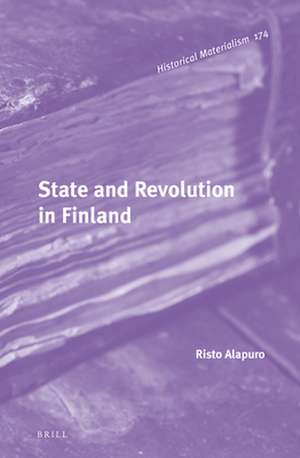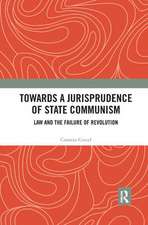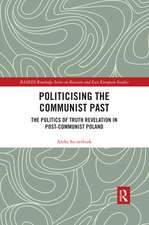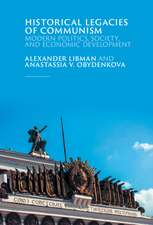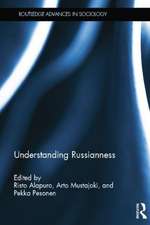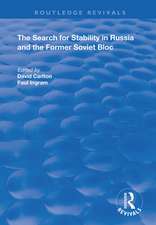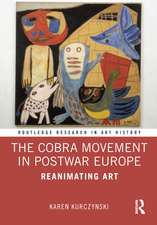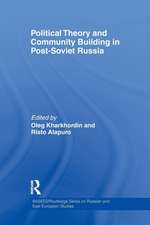State and Revolution in Finland: Historical Materialism Book Series, cartea 174
Autor Risto Alapuroen Limba Engleză Hardback – 7 noi 2018
This second edition inlcudes a new Postscript.
Din seria Historical Materialism Book Series
-
 Preț: 215.03 lei
Preț: 215.03 lei - 18%
 Preț: 966.97 lei
Preț: 966.97 lei - 18%
 Preț: 990.17 lei
Preț: 990.17 lei - 18%
 Preț: 1092.16 lei
Preț: 1092.16 lei - 18%
 Preț: 1229.68 lei
Preț: 1229.68 lei - 18%
 Preț: 1241.69 lei
Preț: 1241.69 lei - 18%
 Preț: 1190.02 lei
Preț: 1190.02 lei - 18%
 Preț: 893.05 lei
Preț: 893.05 lei - 18%
 Preț: 1401.90 lei
Preț: 1401.90 lei - 18%
 Preț: 928.61 lei
Preț: 928.61 lei - 18%
 Preț: 690.93 lei
Preț: 690.93 lei -
 Preț: 268.72 lei
Preț: 268.72 lei - 18%
 Preț: 674.66 lei
Preț: 674.66 lei - 18%
 Preț: 606.89 lei
Preț: 606.89 lei - 18%
 Preț: 783.83 lei
Preț: 783.83 lei - 18%
 Preț: 584.79 lei
Preț: 584.79 lei - 18%
 Preț: 711.88 lei
Preț: 711.88 lei - 18%
 Preț: 653.06 lei
Preț: 653.06 lei - 18%
 Preț: 531.92 lei
Preț: 531.92 lei - 18%
 Preț: 618.25 lei
Preț: 618.25 lei - 18%
 Preț: 647.76 lei
Preț: 647.76 lei - 18%
 Preț: 710.71 lei
Preț: 710.71 lei - 18%
 Preț: 922.25 lei
Preț: 922.25 lei - 18%
 Preț: 810.75 lei
Preț: 810.75 lei - 18%
 Preț: 996.79 lei
Preț: 996.79 lei - 18%
 Preț: 815.23 lei
Preț: 815.23 lei - 18%
 Preț: 1506.61 lei
Preț: 1506.61 lei - 18%
 Preț: 852.64 lei
Preț: 852.64 lei - 18%
 Preț: 645.67 lei
Preț: 645.67 lei - 18%
 Preț: 781.47 lei
Preț: 781.47 lei - 18%
 Preț: 615.24 lei
Preț: 615.24 lei - 18%
 Preț: 1155.48 lei
Preț: 1155.48 lei - 18%
 Preț: 1063.00 lei
Preț: 1063.00 lei - 18%
 Preț: 867.10 lei
Preț: 867.10 lei - 48%
 Preț: 1092.66 lei
Preț: 1092.66 lei - 36%
 Preț: 765.88 lei
Preț: 765.88 lei - 18%
 Preț: 648.19 lei
Preț: 648.19 lei - 18%
 Preț: 759.38 lei
Preț: 759.38 lei - 18%
 Preț: 716.43 lei
Preț: 716.43 lei - 18%
 Preț: 671.15 lei
Preț: 671.15 lei - 18%
 Preț: 671.56 lei
Preț: 671.56 lei - 18%
 Preț: 760.94 lei
Preț: 760.94 lei - 18%
 Preț: 1012.79 lei
Preț: 1012.79 lei - 18%
 Preț: 817.26 lei
Preț: 817.26 lei - 18%
 Preț: 656.87 lei
Preț: 656.87 lei - 18%
 Preț: 1298.20 lei
Preț: 1298.20 lei - 18%
 Preț: 791.88 lei
Preț: 791.88 lei - 18%
 Preț: 971.69 lei
Preț: 971.69 lei - 18%
 Preț: 635.15 lei
Preț: 635.15 lei
Preț: 824.82 lei
Preț vechi: 1005.87 lei
-18% Nou
Puncte Express: 1237
Preț estimativ în valută:
157.85€ • 164.19$ • 130.31£
157.85€ • 164.19$ • 130.31£
Carte indisponibilă temporar
Doresc să fiu notificat când acest titlu va fi disponibil:
Se trimite...
Preluare comenzi: 021 569.72.76
Specificații
ISBN-13: 9789004323360
ISBN-10: 9004323368
Dimensiuni: 155 x 235 mm
Greutate: 0.57 kg
Editura: Brill
Colecția Brill
Seria Historical Materialism Book Series
ISBN-10: 9004323368
Dimensiuni: 155 x 235 mm
Greutate: 0.57 kg
Editura: Brill
Colecția Brill
Seria Historical Materialism Book Series
Cuprins
AcknowledgementsMaps, Tables and Figures
1 The Formation of a Small Polity1The Problem2A Comparative Perspective3What Is to Be Explained4Plan of the Book
2 Dominant Groups and State-Making1The Early Nineteenth Century2Economic Integration3The Late Nineteenth Century
3 The Agrarian Class Structure and Industrial Workers1The Industrial and Agricultural Revolutions in Finland2Freeholding Peasants and Agrarian Workers3The Link Between Industrial and Agrarian Workers4Crofters
4 Territorial Integration1Finnish Regions up to 18092Reorientation from Stockholm to St. Petersburg3Territorial Integration in the Late Nineteenth Century4Core-Periphery Interaction – the County of Viipuri and Eastern Finland5South-Western Finland as a Core Region6Declining Ostrobothnia7Division of Labour and State Penetration in Northern Finland8Summary
5 Finnish Nationalism1The Dual Nature of Nationalism in Nineteenth-Century Europe2Finland in a European Perspective3The Consolidation of a National Culture4Conclusion
6 Before the Revolution: Organisation, Mobilisation, and the Role of Russia1Early Mass Organisation2The Finno-Russian Conflict3The General Strike of 1905, Parliamentary Reform, and the Rise of Agrarian Socialism
7 Regional Consolidation of Party Support1Regions as Loci of Party Systems2The South-Western Core Region3The County of Viipuri4Ostrobothnia5Eastern Finland6Northern Finland7Conclusions
8 On Preconditions for Revolutionary Situations
9 The Abortive Revolution of 1917–19181Socialists within the Polity2The Rise of Multiple Sovereignty3The Revolutionary Situation4The Aftermath5The Social and Regional Basis for the Revolution6On the Character of the Finnish Revolution7Breakdown of Society or Contest for State Power?
10 State and Nation after the Failed Revolution1The Failed Revolution and the Nation2The Persistence of the Volcanic Model of the Finnish Revolution3On the State, the Nation, and Class Balance4The Lapua Movement, 1930–25The Mass Movement and the Dominant Classes in Finnish Fascism
11 Eastern European Revolutionary Movements1National Movements in the Baltic Provinces2Revolution in the Baltic Provinces, 1905 and 1917–183Challenges in East-Central Europe4Fascism in Eastern Europe
12 The Formation of Finland in Europe1Economic Consolidation2The Formation of State and Nation3Political Organisation and Mobilisation before 19174Revolutionary Situations in Small European Polities5State and Revolution in Finland
Postscript to the Second Edition1A Personal Note2A Recapitulation3The Reception of the Comparative Perspective4Structures and Actors5The Associational Tradition in the Political Process6Causes and Scripts
ReferencesIndex
1 The Formation of a Small Polity1The Problem2A Comparative Perspective3What Is to Be Explained4Plan of the Book
Part 1 State-Making and the Class Structure
2 Dominant Groups and State-Making1The Early Nineteenth Century2Economic Integration3The Late Nineteenth Century
3 The Agrarian Class Structure and Industrial Workers1The Industrial and Agricultural Revolutions in Finland2Freeholding Peasants and Agrarian Workers3The Link Between Industrial and Agrarian Workers4Crofters
4 Territorial Integration1Finnish Regions up to 18092Reorientation from Stockholm to St. Petersburg3Territorial Integration in the Late Nineteenth Century4Core-Periphery Interaction – the County of Viipuri and Eastern Finland5South-Western Finland as a Core Region6Declining Ostrobothnia7Division of Labour and State Penetration in Northern Finland8Summary
Part 2 National Integration and Class Integration
5 Finnish Nationalism1The Dual Nature of Nationalism in Nineteenth-Century Europe2Finland in a European Perspective3The Consolidation of a National Culture4Conclusion
6 Before the Revolution: Organisation, Mobilisation, and the Role of Russia1Early Mass Organisation2The Finno-Russian Conflict3The General Strike of 1905, Parliamentary Reform, and the Rise of Agrarian Socialism
7 Regional Consolidation of Party Support1Regions as Loci of Party Systems2The South-Western Core Region3The County of Viipuri4Ostrobothnia5Eastern Finland6Northern Finland7Conclusions
Part 3 The Abortive Revolution
8 On Preconditions for Revolutionary Situations
9 The Abortive Revolution of 1917–19181Socialists within the Polity2The Rise of Multiple Sovereignty3The Revolutionary Situation4The Aftermath5The Social and Regional Basis for the Revolution6On the Character of the Finnish Revolution7Breakdown of Society or Contest for State Power?
10 State and Nation after the Failed Revolution1The Failed Revolution and the Nation2The Persistence of the Volcanic Model of the Finnish Revolution3On the State, the Nation, and Class Balance4The Lapua Movement, 1930–25The Mass Movement and the Dominant Classes in Finnish Fascism
Part 4 The Finnish State and Revolution in a European Perspective
11 Eastern European Revolutionary Movements1National Movements in the Baltic Provinces2Revolution in the Baltic Provinces, 1905 and 1917–183Challenges in East-Central Europe4Fascism in Eastern Europe
12 The Formation of Finland in Europe1Economic Consolidation2The Formation of State and Nation3Political Organisation and Mobilisation before 19174Revolutionary Situations in Small European Polities5State and Revolution in Finland
Postscript to the Second Edition1A Personal Note2A Recapitulation3The Reception of the Comparative Perspective4Structures and Actors5The Associational Tradition in the Political Process6Causes and Scripts
ReferencesIndex
Notă biografică
Risto Alapuro, Ph.D. in Sociology, University of Helsinki (1973), is (retired) Professor of Sociology at the University of Helsinki. He co-edited recent publications Political Theory and Community-Building in Post-Soviet Russia (Routledge, 2011) and Nordic Associations in a European Perspective (Nomos, 2010).
Recenzii
“Alapuro offers an adept, lucid, and original analysis of class struggle and political change in small countries. His analysis is rich with implications for the contemporary world. Theoretically alert without resort to pomp or jargon, his book provides a remarkable synthesis of recent efforts to understand the connections between domestic politics and the international system."
- Charles Tilly, New School for Social Research
From the reviews of the first edition:
“I very strongly recommend this fine book to all comparative social scientists interested in European political development, revolutions, state building, or nationalism.”
- John D. Stephens, American Journal of Sociology
“The merit of Alapuro’s book lies (…) in his use of familiar material to produce an explanatory model that can both give a coherent explanation of the pattern of Finland’s development and be used to generate generalizations, on a comparative basis, about the politics of small nation states.”
- Anthony F. Upton, The American Historical Review
“Alapuro demonstrates so beautifully the rich context which sets Finnish political development apart from the other small countries and for that the reader should be truly grateful.”
- Francis G. Castles, Acta Sociologica
“[T]he book has a richness [?, lödighet] that will be difficult for others to achieve.” [“boken har en lödighet som det kommer att bli svårt för andra att nå upp till”].
- David Kirby, Historisk Tidskrift för Finland
”Alapuro presents a richly documented and analytically sophisticated case study of a unique nation-state, Western in its class structure but similar to Eastern European states in terms of its dependency.”
- Peter Kivisto, Contemporary Sociology
“It is a marvelous book.”
- Jorunn Bjórgum, Journal of Social History
- Charles Tilly, New School for Social Research
From the reviews of the first edition:
“I very strongly recommend this fine book to all comparative social scientists interested in European political development, revolutions, state building, or nationalism.”
- John D. Stephens, American Journal of Sociology
“The merit of Alapuro’s book lies (…) in his use of familiar material to produce an explanatory model that can both give a coherent explanation of the pattern of Finland’s development and be used to generate generalizations, on a comparative basis, about the politics of small nation states.”
- Anthony F. Upton, The American Historical Review
“Alapuro demonstrates so beautifully the rich context which sets Finnish political development apart from the other small countries and for that the reader should be truly grateful.”
- Francis G. Castles, Acta Sociologica
“[T]he book has a richness [?, lödighet] that will be difficult for others to achieve.” [“boken har en lödighet som det kommer att bli svårt för andra att nå upp till”].
- David Kirby, Historisk Tidskrift för Finland
”Alapuro presents a richly documented and analytically sophisticated case study of a unique nation-state, Western in its class structure but similar to Eastern European states in terms of its dependency.”
- Peter Kivisto, Contemporary Sociology
“It is a marvelous book.”
- Jorunn Bjórgum, Journal of Social History
